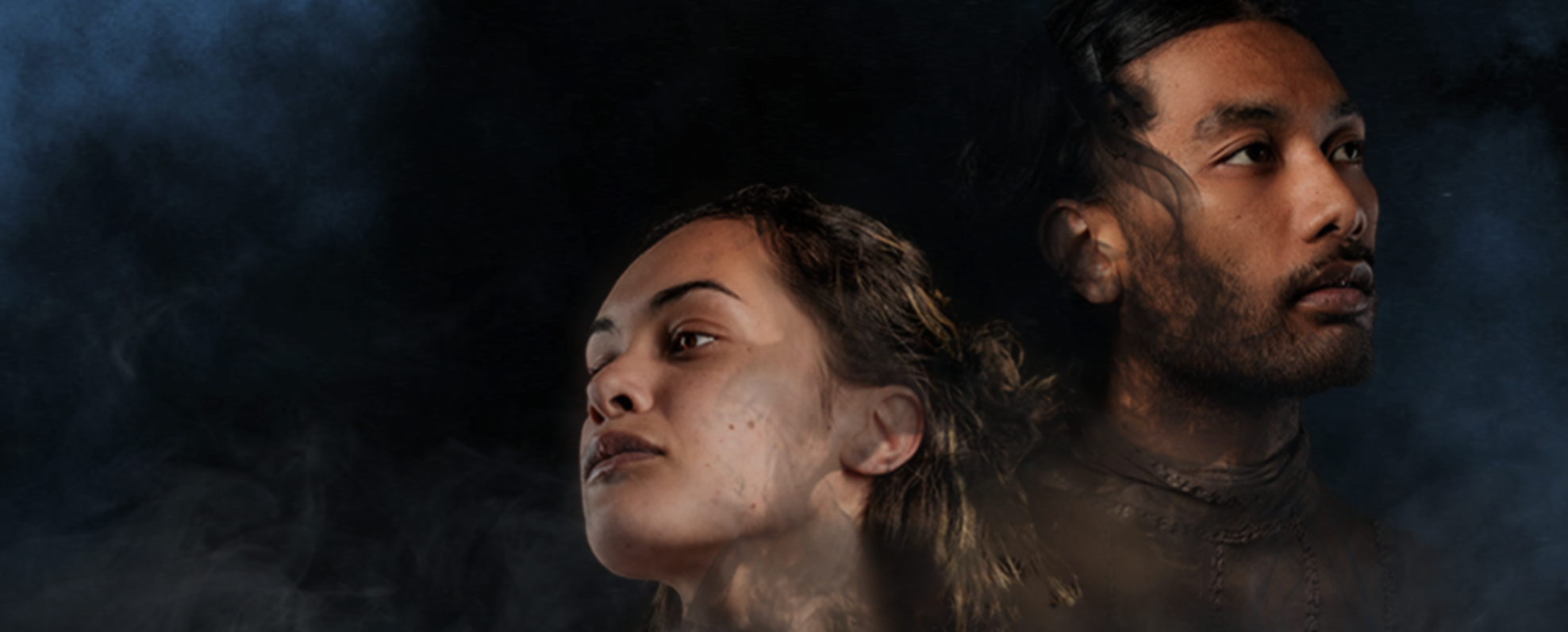Sean Burnett Dugdale-Martin
On God follows four stories: Nafanua (Luz-Eilana Folau-Tovine) and Jesus (Tasman Kaitara), two uni students Natano (Kasi Valu) and Tyler (Tamia Filipo), Losa (Maurea Perez-Varea) and grandson Ioane (Justice Tavita Kalolo), and finally two siblings Alia (Kimiora Honeycombe) and Sefa (Seiyan Thompson-Tonga). Each narrative set their scene well and over the course of the production offer critical contradictions to a point made in the scene before.
I love the casting of this show. Everybody brings to their character exactly what is needed in their dynamic, especially Kaitara as Jesus who seemed to embody a meekness which gave Jesus less of a savior-vibe and more ‘sorry for everything’. The cast, often in their pairs, had great chemistry and energy with each other. Folau-Tovine really brought the war to the goddess, Tavita Kalolo brought a realistic depth of familial love to his character, Thompson-Tonga’s calculating yet jovial complexities in Sefa were perfectly matched opposite Honeycombe who, for me, embodied the modern day Nafanua who exists in an academic context weaponizing indigenous rage against gentrified religion and academia from inside the institution. Valu and Filipo as their frustrated pair each quickly set the pace of the show with style. Lastly, if there could possibly be a standout amongst incredible performers it would be Perez-Varea who entranced us with her charm, spirituality and calm, gentle demeanor when playing Losa, but also demonstrating her comedy in other ensemble roles within the production.
As written on the BATS page “This new development show investigates Pasifika spirituality in both pre-colonial and modern contexts. Investigating religion through a modern lens, from the introduction of Christianity to the current generations finding their connection to faith in a society becoming increasingly more secular.” To this end, the play has four storylines through which it follows, each adding its own layer of complexity onto the investigation. Primarily, there is Nafanua and Jesus who are at odds since Nafanua, the Samoan Goddess of War, feels forgotten by her people in no small part due to the colonial-introduced Christianity. Jesus feels misinterpreted by humans, and is apologetic, although does not feel entirely to blame.
The mortal storylines are that of Natano and Tyler who have a performance for their class coming up which Tyler wants to do a siva for. Not because the institution expects that of the only Samoan kids in the class but simply because she wants to do it. The demon for Natano and Tyler is: are you dishonest with wanting to inhabit your own culture (bad) or are you honest and inhabit your culture and as a consequence are used as diversity marketing for the institution (also bad). A powerful set-up made simple by Fa’atui who, more than once in this play, demonstrates his story weaving abilities. Losa and Ioane are Nani and Grandson and in our visits to their storyline we are given a succinct and evocative narrative of the power of familial love and the glue of spirituality. It is this storyline which gives the play its deep, third dimension. Finally, Alia and Sefa are siblings at odds about responsibilities to the family, Church and the self, and it is these two that embody a mortal pair at odds nearly as much as the immortal pair. In some ways a modern reflection of the ethereal conflict.
Fa’atui must be praised for all of the work done in this development season. This play is a strong start to something that could be taught in schools and universities. I do not feel as though the work is done. The depth and intricacies of the conversation started in On God does not feel, to me at least, that it meets a conclusion of as high a caliber as the start of the play. Some of the narratives have conclusions that are fine, narrative endings that I’ve seen before elsewhere, but don’t really hit home with what I think the play is. I am confident that this isn’t a skill issue and I would put money on it being a time constraints issue. Fa’atui wears many hats in this production and there’s a lot of paperwork that goes into an MFA.
As a sold-out development season this should be hailed as a triumph of new talent and I hope the team celebrates their success. Later on, after the party is over and the resting has rejuvenated the team, I can’t wait to see the next sell-out season of On God where the impactful and resonating nature of each storyline have been taken to their profound conclusions.
The season has concluded it’s run at BATS Theatre but you can still find the event information here.






